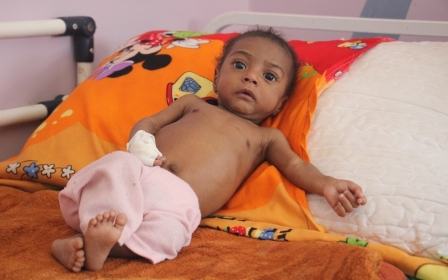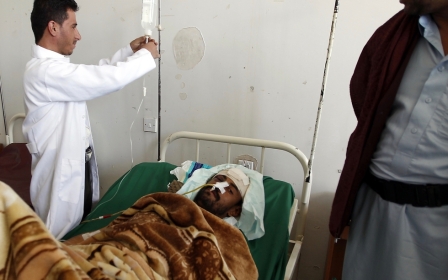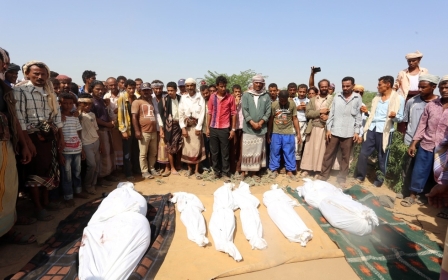Top military brass among those killed in Yemen funeral strike
Leading rebel officers were among those killed in the weekend air strike on a funeral in Yemen's capital, blamed on Saudi-led coalition warplanes, according to official media reports on Tuesday.
Funerals for several top Houthi-allied officers and officials killed in Saturday's strike were held in Sanaa on Tuesday, Saba news agency reported.
The Saudi-led coalition has been blamed for the air strike, one of the deadliest since it launched a military campaign against rebels in March 2015.
After initially denying responsibility, the Saudi-led coalition said Sunday it was ready to investigate the "regrettable and painful" strike, while UN chief Ban Ki-Moon demanded a "prompt and impartial" probe.
UN envoy Ismail Ould Cheikh Ahmed called on the Saudi-led coalition to publish the results of its investigation into the strikes.
"We must do everything possible to ensure the authors of these heinous attacks face justice," he said on Monday.
Three commanders of the elite Republican Guard, loyal to former president Ali Abdullah Saleh who is allied with the Houthis, were said to be among those killed.
They were named by Saba as General Ali al-Jaefi, head of the Republican Guard, and Brigadiers Abdulmalik Marzooq and Ali al-Hamzi.
General Ahmed Manea, a member of the Supreme Security Committee, was also among those killed in the air strike, which claimed the lives of at least 140 people and wounded more than 525 others, according to a UN tally.
Deputy security chief of Sanaa province, Ahmed al-Shalef, and the head of the rebels' civil status authority, brigadier Yehya al-Rowaishan, were also listed as killed in the attack.
Hezbollah calls for 'solidarity'
The head of Lebanon's Hezbollah movement on Tuesday called for widespread protests in solidarity with Yemen after the strike.
Hassan Nasrallah made a rare live appearance in front of thousands of supporters in a southern suburb of Beirut on the eve of Ashura, one of the most important commemorations on the Shia Muslim calendar.
"Tomorrow, we will renew... our stance beside the oppressed, honourable, slain, and besieged Yemeni people," Nasrallah said, referring to Wednesday's morning march to mark Ashura.
"We say to them: You are not alone. We are all Yemen," he said in comments carried live by the group's television station al-Manar.
The head of the powerful Shia movement was met with chants of "Death to the Saud family" from supporters.
Missile attack on US Navy ships
Following the deadly air strike, a missile attack launched from Houthi-controlled territory on Sunday missed a pair of US warships in the Red Sea off the coast of Yemen, a US official said.
The United States threatened on Tuesday to retaliate for the attack.
"Counterstrike, retaliatory strike: I can tell you that those things are things that we are looking at," said Navy Captain Jeff Davis, a Defence Department spokesman.
The US Navy said the missiles, which fell short of the USS Mason, a destroyer, and the USS Ponce, an amphibious warfare ship, were fired within an hour of each other on Sunday.
"We want very much to get to the bottom of what happened," said Davis. "We're going to find out who did this and we will take action accordingly."
"We will make sure that anybody who interferes with freedom of navigation and puts US Navy ships at risk understands they do so at their own peril," he said.
The United States backs the Saudi-led coalition, and its military provides intelligence and air-refuelling for the coalition’s aircrafts. It also supplies advanced munitions and logistics support to the Saudi war effort and is the kingdom's biggest arms supplier.
But US air forces are not directly involved in air strikes in Yemen, which are increasingly criticised by the international community for their devastating impact on civilians.
Middle East Eye propose une couverture et une analyse indépendantes et incomparables du Moyen-Orient, de l’Afrique du Nord et d’autres régions du monde. Pour en savoir plus sur la reprise de ce contenu et les frais qui s’appliquent, veuillez remplir ce formulaire [en anglais]. Pour en savoir plus sur MEE, cliquez ici [en anglais].




